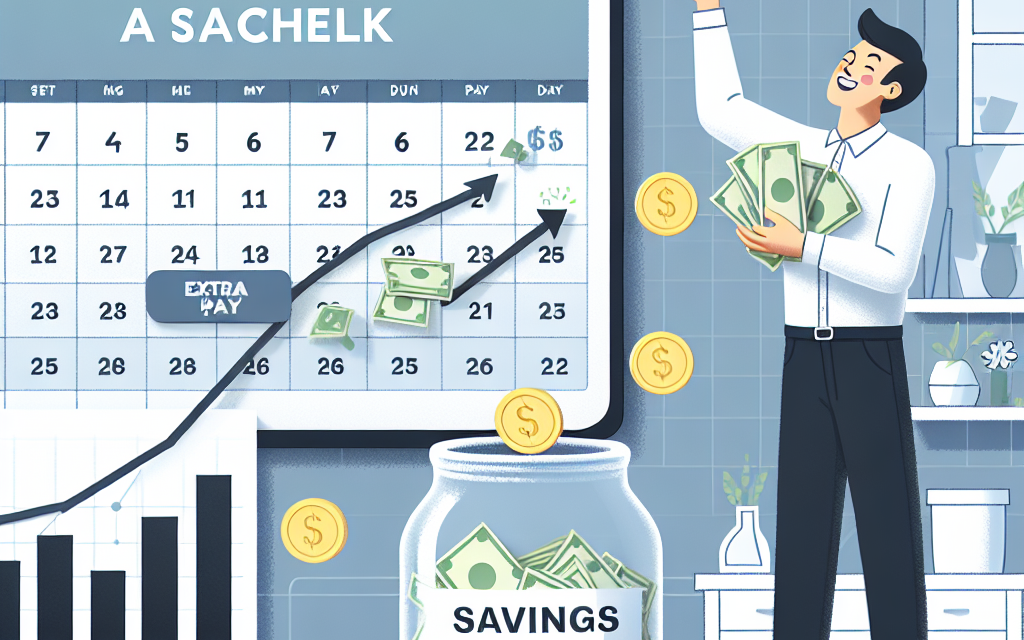“Unlock Extra Savings: Make the Most of Your 3-Paycheck Month!”
Introduction
Maximizing your savings during a 3-paycheck month can significantly boost your financial health and help you reach your savings goals more quickly. With an extra paycheck, you have a unique opportunity to allocate funds towards savings, debt repayment, or investments. By strategically planning how to utilize this additional income, you can enhance your emergency fund, contribute to retirement accounts, or tackle outstanding debts. This guide will explore effective strategies to make the most of your 3-paycheck month, ensuring that you maximize your savings potential and set yourself up for long-term financial success.
Budgeting Strategies for a 3-Paycheck Month
Maximizing your savings during a three-paycheck month can be a strategic opportunity to bolster your financial health. When you receive an extra paycheck, it is essential to approach your budgeting with a clear plan to ensure that this windfall is utilized effectively. First and foremost, it is crucial to assess your current financial situation. Begin by reviewing your monthly expenses, including fixed costs such as rent or mortgage, utilities, and insurance, as well as variable expenses like groceries and entertainment. By understanding your baseline spending, you can identify areas where you might allocate additional funds from the extra paycheck.
Once you have a comprehensive view of your expenses, consider prioritizing your financial goals. For instance, if you have outstanding debts, such as credit card balances or student loans, directing a portion of your extra income toward these liabilities can significantly reduce your financial burden. Paying down high-interest debt not only saves you money in interest payments but also improves your credit score over time. Alternatively, if you are in a stable financial position, you might choose to enhance your savings. Establishing or contributing to an emergency fund is a prudent strategy, as it provides a safety net for unexpected expenses that may arise in the future.
In addition to debt repayment and savings, consider investing in your future. A three-paycheck month presents an excellent opportunity to contribute to retirement accounts, such as a 401(k) or an IRA. By increasing your contributions during this month, you can take advantage of compound interest, which can significantly grow your wealth over time. Furthermore, if your employer offers a matching contribution, maximizing your contributions can lead to substantial long-term benefits.
Moreover, it is essential to remain mindful of your spending habits during this month. While the extra paycheck may tempt you to indulge in discretionary purchases, it is wise to resist the urge to overspend. Instead, create a budget that allocates a specific amount for entertainment or leisure activities, ensuring that you enjoy the benefits of your extra income without compromising your financial goals. This balanced approach allows you to celebrate the additional income while maintaining a focus on long-term financial stability.
As you navigate your budgeting strategies, consider the importance of tracking your progress. Utilize budgeting tools or apps to monitor your spending and savings throughout the month. This practice not only helps you stay accountable but also provides insights into your financial habits, allowing you to make informed adjustments in the future. Additionally, reflecting on your financial goals regularly can reinforce your commitment to maximizing your savings during this unique month.
In conclusion, a three-paycheck month offers a valuable opportunity to enhance your financial standing through strategic budgeting. By assessing your expenses, prioritizing debt repayment, contributing to savings and retirement accounts, and maintaining mindful spending habits, you can effectively maximize the benefits of this extra income. Ultimately, the key to success lies in creating a well-structured plan that aligns with your financial goals, ensuring that you make the most of this advantageous situation. By adopting these strategies, you can pave the way for a more secure financial future.
Smart Ways to Allocate Extra Income
In a three-paycheck month, individuals often find themselves with an unexpected financial windfall. This additional income presents a unique opportunity to enhance savings and improve overall financial health. To maximize the benefits of this extra paycheck, it is essential to adopt a strategic approach to allocating these funds. By carefully considering various options, individuals can make informed decisions that align with their long-term financial goals.
One of the most prudent strategies is to prioritize contributions to an emergency fund. An emergency fund serves as a financial safety net, providing peace of mind in the event of unforeseen expenses such as medical emergencies or car repairs. Financial experts typically recommend setting aside three to six months’ worth of living expenses in this fund. Therefore, using a portion of the extra paycheck to bolster this reserve can significantly enhance financial security. By doing so, individuals can avoid relying on credit cards or loans during challenging times, ultimately saving money on interest payments.
In addition to strengthening an emergency fund, allocating extra income towards retirement savings is another wise decision. Contributing to a 401(k) or an Individual Retirement Account (IRA) can yield substantial long-term benefits. Many employers offer matching contributions for 401(k) plans, which essentially provides free money for retirement savings. By taking advantage of this opportunity, individuals can maximize their retirement contributions and secure a more comfortable future. Furthermore, the power of compound interest means that even small contributions made now can grow significantly over time, making this an ideal use of extra income.
Moreover, individuals should consider paying down high-interest debt, such as credit card balances. High-interest debt can be a significant financial burden, often leading to a cycle of payments that can be difficult to escape. By allocating a portion of the extra paycheck to pay down these debts, individuals can reduce their overall financial obligations and save on interest payments in the long run. This proactive approach not only improves credit scores but also enhances financial freedom, allowing individuals to allocate funds towards more productive investments in the future.
Another effective strategy is to invest in personal development or education. Investing in oneself can yield substantial returns, whether through formal education, professional development courses, or skill-building workshops. By enhancing skills and knowledge, individuals can increase their earning potential and open doors to new career opportunities. This investment in personal growth can be particularly beneficial in a rapidly changing job market, where adaptability and continuous learning are essential.
Finally, it is important to consider setting aside a portion of the extra income for short-term savings goals. Whether it is saving for a vacation, a new car, or home improvements, having specific savings goals can provide motivation and a sense of accomplishment. By creating a dedicated savings account for these goals, individuals can track their progress and stay focused on their financial aspirations.
In conclusion, a three-paycheck month offers a valuable opportunity to enhance financial stability and achieve long-term goals. By strategically allocating extra income towards an emergency fund, retirement savings, debt repayment, personal development, and short-term savings goals, individuals can maximize the benefits of this additional paycheck. Ultimately, making informed financial decisions during these months can lead to a more secure and prosperous future.
Building an Emergency Fund with Extra Paychecks
In a three-paycheck month, individuals often find themselves with an unexpected financial windfall. This additional income presents a unique opportunity to bolster one’s financial stability, particularly through the establishment or enhancement of an emergency fund. An emergency fund serves as a financial safety net, providing peace of mind and security in times of unforeseen circumstances, such as medical emergencies, job loss, or urgent home repairs. Therefore, it is prudent to consider how best to allocate this extra paycheck to maximize savings and ensure long-term financial health.
To begin with, it is essential to understand the recommended amount for an emergency fund. Financial experts typically advise saving three to six months’ worth of living expenses. This figure can vary based on individual circumstances, such as job stability and personal financial obligations. Consequently, assessing one’s current savings and determining how much more is needed to reach this goal is a critical first step. By doing so, individuals can create a clear target for their extra paycheck, allowing them to make informed decisions about their savings strategy.
Once the target amount is established, the next step involves deciding how to allocate the extra paycheck effectively. One approach is to deposit the entire amount directly into a high-yield savings account specifically designated for emergencies. High-yield savings accounts typically offer better interest rates than traditional savings accounts, allowing funds to grow more rapidly over time. This strategy not only enhances the emergency fund but also takes advantage of compound interest, which can significantly increase savings in the long run. Moreover, by keeping the emergency fund in a separate account, individuals can avoid the temptation to dip into these savings for non-emergency expenses.
In addition to direct deposits, individuals may also consider setting up automatic transfers from their primary checking account to their emergency fund. This method ensures that savings are consistently prioritized, even after the extra paycheck has been spent or allocated elsewhere. By automating the savings process, individuals can cultivate a habit of saving that reinforces financial discipline and encourages a proactive approach to managing unexpected expenses.
Furthermore, it is important to regularly review and adjust the emergency fund as financial situations evolve. Life changes, such as a new job, marriage, or the birth of a child, can significantly impact one’s financial needs. Therefore, revisiting the emergency fund goal periodically ensures that it remains aligned with current circumstances. If the extra paycheck allows for exceeding the initial target, individuals should consider increasing their savings goal to provide even greater security.
In conclusion, a three-paycheck month offers a valuable opportunity to enhance financial stability through the establishment or growth of an emergency fund. By understanding the recommended savings amounts, effectively allocating the extra paycheck, and automating savings, individuals can create a robust financial safety net. Additionally, regularly reviewing and adjusting the fund ensures that it remains relevant to one’s current financial situation. Ultimately, by taking these proactive steps, individuals can maximize their savings and foster a sense of security that will serve them well in times of need.
Paying Off Debt Faster in a 3-Paycheck Month
A three-paycheck month presents a unique opportunity for individuals to enhance their financial standing, particularly when it comes to paying off debt. This additional paycheck can serve as a powerful tool for accelerating debt repayment, allowing individuals to make significant strides toward financial freedom. To maximize the benefits of this extra income, it is essential to adopt a strategic approach that prioritizes debt reduction while maintaining a balanced financial plan.
First and foremost, it is crucial to assess your current debt situation. Begin by listing all outstanding debts, including credit cards, personal loans, and any other obligations. By understanding the total amount owed and the interest rates associated with each debt, you can make informed decisions about where to allocate your extra funds. This assessment not only provides clarity but also helps in identifying which debts are costing you the most in interest payments.
Once you have a clear picture of your debts, consider using the additional paycheck to make a lump-sum payment on the debt with the highest interest rate. This strategy, often referred to as the avalanche method, can significantly reduce the total interest paid over time. By targeting high-interest debts first, you can free up more of your monthly budget for savings or other financial goals in the future. Alternatively, if you prefer a more motivational approach, you might opt for the snowball method, which involves paying off the smallest debts first. This method can provide psychological benefits, as eliminating smaller debts can create a sense of accomplishment and encourage continued progress.
In addition to making lump-sum payments, it is wise to consider increasing your regular monthly payments on existing debts. With the extra income from a three-paycheck month, you can allocate a portion of your paycheck to boost your monthly payments. This not only shortens the repayment period but also reduces the overall interest paid, allowing you to become debt-free more quickly. Furthermore, if your lender allows it, consider making bi-weekly payments instead of monthly payments. This approach can lead to an extra payment each year, further accelerating your debt repayment journey.
Moreover, it is essential to remain disciplined and avoid the temptation to use the extra funds for non-essential purchases. While it may be tempting to indulge in a luxury or treat yourself, redirecting this money toward debt repayment can yield far greater long-term benefits. Establishing a budget that prioritizes debt repayment during a three-paycheck month can help maintain focus and ensure that the additional income is used effectively.
As you work toward paying off your debts, it is also important to keep an eye on your overall financial health. Consider setting aside a portion of the extra paycheck for an emergency fund or savings account. This practice not only provides a safety net for unexpected expenses but also prevents the need to rely on credit cards in the future, thereby reducing the likelihood of accumulating more debt.
In conclusion, a three-paycheck month offers a valuable opportunity to accelerate debt repayment and improve your financial situation. By strategically assessing your debts, making lump-sum payments, increasing regular payments, and maintaining discipline, you can maximize the benefits of this additional income. Ultimately, the goal is to achieve financial freedom, and with careful planning and execution, a three-paycheck month can be a significant step toward that objective.
Investing Your Extra Income Wisely
In a three-paycheck month, individuals often find themselves with an unexpected financial windfall. This additional income presents a unique opportunity to enhance one’s financial stability and future prospects. However, the key to maximizing the benefits of this extra paycheck lies in investing it wisely. By adopting a strategic approach, individuals can ensure that their financial decisions contribute to long-term wealth accumulation and security.
To begin with, it is essential to assess one’s current financial situation. Before allocating the extra income, individuals should review their existing debts, savings, and investment portfolios. Paying off high-interest debts, such as credit card balances, should be a priority. By eliminating these financial burdens, individuals can free up future income for savings and investments, ultimately leading to a more secure financial position. Once debts are managed, the next step involves evaluating emergency savings. Financial experts recommend maintaining an emergency fund that covers three to six months’ worth of living expenses. If this fund is not yet fully established, directing a portion of the extra paycheck towards it can provide peace of mind and financial resilience in the face of unexpected expenses.
After addressing immediate financial needs, individuals can turn their attention to investment opportunities. One prudent option is to contribute to retirement accounts, such as a 401(k) or an Individual Retirement Account (IRA). These accounts not only offer tax advantages but also facilitate long-term growth through compound interest. By maximizing contributions during a three-paycheck month, individuals can significantly enhance their retirement savings, ensuring a more comfortable future. Furthermore, if an employer offers a matching contribution for retirement savings, it is wise to take full advantage of this benefit, as it effectively represents free money that can accelerate wealth accumulation.
In addition to retirement accounts, individuals may consider diversifying their investment portfolios. Investing in stocks, bonds, or mutual funds can provide opportunities for growth beyond traditional savings accounts. While the stock market can be volatile, a well-researched and diversified investment strategy can yield substantial returns over time. For those who may be hesitant to navigate the complexities of the stock market, consulting with a financial advisor can provide valuable insights and guidance tailored to individual risk tolerance and financial goals.
Moreover, individuals should not overlook the potential of investing in education or skill development. Allocating a portion of the extra income towards courses, certifications, or workshops can enhance one’s professional qualifications and increase earning potential in the long run. This investment in personal development can yield significant returns, both financially and personally, as it opens doors to new career opportunities and advancements.
Lastly, it is important to consider the impact of charitable giving. Allocating a portion of the extra paycheck to charitable organizations not only supports causes that resonate personally but can also provide tax deductions. This dual benefit allows individuals to contribute positively to their communities while simultaneously enhancing their financial standing.
In conclusion, a three-paycheck month offers a valuable opportunity to invest extra income wisely. By prioritizing debt repayment, bolstering emergency savings, contributing to retirement accounts, diversifying investments, investing in personal development, and considering charitable giving, individuals can maximize the benefits of their additional income. Ultimately, these strategic financial decisions can pave the way for a more secure and prosperous future.
Planning for Future Expenses with Additional Paychecks
In a typical month, most individuals receive two paychecks, which can make budgeting and financial planning relatively straightforward. However, when a month includes three paychecks, it presents a unique opportunity to maximize savings and prepare for future expenses. Understanding how to effectively allocate this additional income can significantly enhance financial stability and contribute to long-term financial goals.
To begin with, it is essential to assess your current financial situation. Take a moment to review your existing budget, focusing on fixed expenses such as rent or mortgage payments, utilities, and insurance. By identifying these obligations, you can determine how much of your third paycheck can be allocated toward savings or future expenses. This assessment is crucial because it allows you to prioritize your financial commitments while also recognizing the potential for additional savings.
Once you have a clear understanding of your fixed expenses, consider setting aside a portion of the third paycheck for an emergency fund. An emergency fund serves as a financial safety net, providing peace of mind in the event of unexpected expenses such as medical bills or car repairs. Financial experts typically recommend saving three to six months’ worth of living expenses in an easily accessible account. By contributing to this fund during a three-paycheck month, you can make significant progress toward achieving this goal, thereby enhancing your overall financial security.
In addition to bolstering your emergency fund, it is wise to allocate some of the extra income toward upcoming expenses. For instance, if you anticipate significant costs in the near future, such as holiday shopping, home repairs, or tuition payments, using the additional paycheck to cover these expenses can alleviate financial stress later on. By planning ahead and setting aside funds for these anticipated costs, you can avoid the temptation to rely on credit cards or loans, which can lead to debt accumulation and financial strain.
Moreover, consider the benefits of investing a portion of your third paycheck. Investing can be a powerful tool for building wealth over time, and even small contributions can yield significant returns in the long run. Whether you choose to invest in a retirement account, stocks, or mutual funds, the key is to start early and remain consistent. By taking advantage of the additional income during a three-paycheck month, you can set the stage for a more secure financial future.
Furthermore, it is important to reflect on your long-term financial goals. Whether you are saving for a home, planning for retirement, or aiming to pay off debt, using the extra paycheck strategically can help you make substantial progress toward these objectives. By aligning your spending and saving habits with your financial aspirations, you can create a more cohesive and effective financial plan.
In conclusion, a three-paycheck month offers a valuable opportunity to enhance your financial well-being. By carefully planning for future expenses, bolstering your emergency fund, and considering investments, you can maximize the benefits of this additional income. Ultimately, the key to successful financial management lies in proactive planning and disciplined execution. By taking the time to assess your financial situation and make informed decisions, you can ensure that your extra paycheck contributes meaningfully to your overall financial health and future stability.
Tips for Avoiding Impulse Spending During Extra Pay Periods
Maximizing your savings during a three-paycheck month can be an excellent opportunity to bolster your financial health, but it also presents unique challenges, particularly in the realm of impulse spending. When an extra paycheck arrives, the temptation to indulge in unplanned purchases can be overwhelming. Therefore, it is crucial to adopt strategies that help you resist these urges and focus on your long-term financial goals.
To begin with, establishing a clear budget is essential. Before the extra paycheck even arrives, take the time to outline your financial priorities. This budget should include essential expenses, savings goals, and discretionary spending limits. By having a well-defined plan in place, you create a framework that guides your spending decisions. This proactive approach not only helps you allocate funds wisely but also reinforces your commitment to saving.
In addition to budgeting, setting specific savings goals can further enhance your ability to resist impulse purchases. For instance, consider designating a portion of your extra paycheck for an emergency fund, retirement account, or a specific savings goal, such as a vacation or home renovation. By having a tangible target in mind, you can shift your focus from immediate gratification to long-term benefits. This mental shift is crucial in curbing the desire to spend impulsively.
Moreover, it is beneficial to create a waiting period for any non-essential purchases. When you feel the urge to buy something on a whim, implement a rule that requires you to wait 24 hours before making the purchase. This brief pause allows you to evaluate whether the item is truly necessary or if it is simply a fleeting desire. Often, after a day of reflection, the initial excitement fades, and you may find that you no longer want the item at all.
Another effective strategy is to limit exposure to temptation. In today’s digital age, it is all too easy to be bombarded with advertisements and promotions that encourage impulse spending. To combat this, consider unsubscribing from promotional emails and unfollowing brands on social media that trigger your desire to shop. By reducing your exposure to these marketing tactics, you can create a more controlled environment that supports your savings goals.
Additionally, consider using cash for discretionary spending. When you allocate a specific amount of cash for entertainment or leisure activities, you create a tangible limit that can help you stay within your budget. Once the cash is gone, you cannot spend any more, which encourages you to think critically about each purchase. This method not only helps you avoid overspending but also fosters a greater appreciation for the value of money.
Finally, it is important to remind yourself of the benefits of saving. Reflecting on your financial goals and the peace of mind that comes with having a solid savings plan can serve as a powerful motivator. Whether it’s the security of an emergency fund or the excitement of a future investment, keeping these goals at the forefront of your mind can help you resist the allure of impulse spending.
In conclusion, while a three-paycheck month presents an opportunity to enhance your financial situation, it also requires vigilance against impulse spending. By establishing a budget, setting specific savings goals, implementing waiting periods for purchases, limiting exposure to temptation, using cash for discretionary spending, and reminding yourself of the benefits of saving, you can navigate this period successfully. Ultimately, these strategies will not only help you maximize your savings but also cultivate healthier financial habits for the future.
Q&A
1. **Question:** What is a 3-paycheck month?
**Answer:** A 3-paycheck month occurs when you receive three paychecks instead of the usual two due to the timing of your pay schedule.
2. **Question:** How can I prioritize my savings during a 3-paycheck month?
**Answer:** Allocate a specific percentage of the extra paycheck to savings, focusing on emergency funds, retirement accounts, or high-interest debt repayment.
3. **Question:** Should I adjust my budget for a 3-paycheck month?
**Answer:** Yes, review and adjust your budget to account for the additional income, ensuring you maximize savings and minimize unnecessary spending.
4. **Question:** What are some effective savings strategies for a 3-paycheck month?
**Answer:** Consider setting up automatic transfers to savings accounts, contributing to retirement plans, or investing in a high-yield savings account.
5. **Question:** Is it wise to treat the extra paycheck as “found money”?
**Answer:** No, it’s better to treat it as part of your income and allocate it thoughtfully rather than spending it impulsively.
6. **Question:** How can I use this month to pay off debt?
**Answer:** Use a portion of the extra paycheck to make additional payments on high-interest debts, which can save you money on interest in the long run.
7. **Question:** What should I avoid doing with my extra paycheck?
**Answer:** Avoid using the extra paycheck for non-essential purchases or lifestyle inflation; instead, focus on long-term financial goals.
Conclusion
Maximizing your savings in a 3-paycheck month can significantly boost your financial health. By strategically allocating the extra income towards savings, debt repayment, or investments, you can enhance your financial stability. Prioritizing high-interest debts, contributing to emergency funds, or increasing retirement contributions are effective strategies. Additionally, creating a budget that accounts for this additional income ensures that you make the most of the opportunity. Ultimately, a focused approach to managing this extra paycheck can lead to substantial long-term financial benefits.





